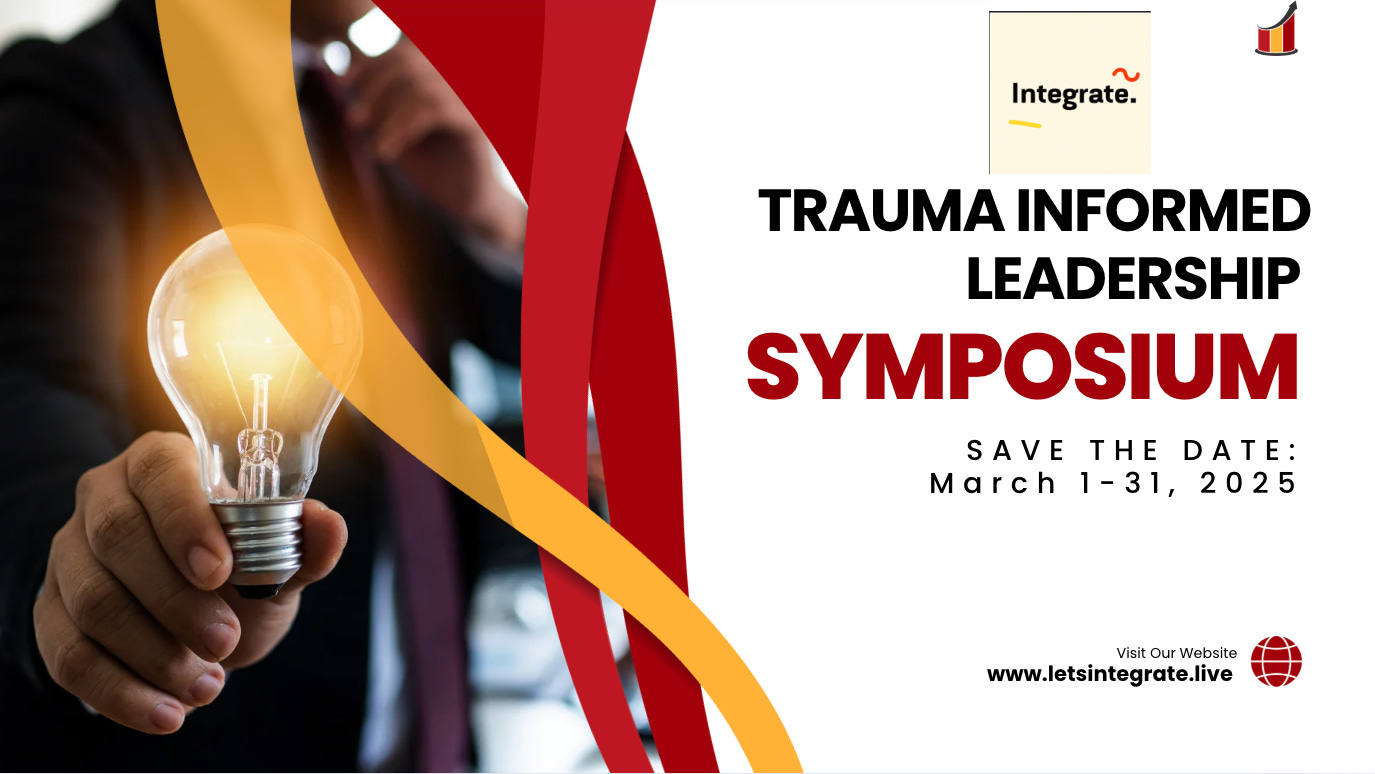How Trauma-Informed Skills Can Transform Our World
By Sarah O'Brien, LCSW
The World is Asking For Us to Have Trauma Informed People Skills
There is a lot happening out in the world right now, particularly if you live over here in the west. There is fear, uncertainty, change that hasn’t been beneficial to all, disparity and discord. Essentially, people are losing their sanity and sense of self all over again—kind of like during the global COVID-19 pandemic, but different. Fear of an illness is different than fears about ideologies, values, rights, humanity as a whole. These kinds of fears drive judgment, exclusion, and reactivity that impact relationships. So, whether, or not, you have experienced something personally traumatic, trauma is all around. Knowing how to work with trauma is, I believe, going to be the make-or-break in the very near future.
Working with the Public is Working with Trauma
What do I mean by that? Make-or-break what? Well, just about everything. Industries, business, marketing, education, interpersonal interactions, personal and professional relationships will need to move with the times, so to say. And the time calls for an understanding of trauma and its impact on people, as well as, understanding how to apply skills to best work with trauma, because as I said, it’s all around. No surprise the psychotherapist is talking about trauma, however, that is not HOW I’m talking about trauma here. Knowing how to work with trauma is not about clinical knowledge, expertise, or skill. You don’t need a background in mental health, relationships, or trauma to get with the times I’m talking about. Trauma informed skill acquisition is available to all. And from where I sit, ALL need to acquire these skills.
You see, trauma informed skills allow you to live, work, relate, interact in ways that are the least likely to cause more harm (or trauma) to other people. This should be important to everyone because science tells us trauma isn’t good for us. The ways in which trauma is not good for us is so multifaceted and layered that I can’t discuss it all here. I can highlight some key things we all would benefit from knowing. First, trauma disconnects us from ourselves, our bodies, our experiences. Even if the trauma happened way back when, it can, and does, still affect us in the present, especially if we haven’t done any work to understand or heal our trauma. Next, trauma disconnects us from others, either from fear of judgment, rejection, pain, and more trauma, or from isolation, exclusion, poor communication and poor emotional regulation. Finally, trauma disconnects us from safety, from a felt sense of safety, either within us or around us. When we feel disconnected from self, disconnected from others, and disconnected from safety we cannot operate, perform, relate, or engage well with our world. If many, many people are in this place, imagine how things would be. We don’t have to stretch too far, as it’s kind of what it’s like right now.
Trauma-Informed Care for is for Everyone
Take a look around, does it seem like people are doing well? Feeling well? Performing well (consistently)? In many ways we are not. Trauma informed care is one way in which we can improve the landscape…for everybody. And this is without systems change, political change, or everyone marching into a therapist’s office to work on their stuff (although I, of course, recommend this). Using trauma-informed skills wherever you are is beneficial for everyone, including you, including you even if you don’t buy into the ‘hype’ about trauma and trauma informed care. Why? Because trauma-informed care focuses on the people, the experience of people, without judging as right or wrong or good or bad. It’s a recognition of the impact of bad shit happening to and around people, even if it didn’t happen to you. When we focus on the experience of people, it opens doors for emotional regulation, coping effectively, connecting safely, and communicating fully. People respond to this kind of thing. People respond to how things make them feel, more than what they think about things, more than what they believe is right about things. To be human is to feel. To differentiate between feelings is self-awareness. To manage feelings effectively to bring yourself back to a calm baseline is self-management (or emotional regulation). To notice others’ feelings is social awareness. To give a shit about other people’s feelings is compassion. Compassion, for self and others, is at the crux of trauma informed care—and it’s high-level humanity. If you don’t care about other people, or if you don’t care about yourself, then you won’t care about trauma-informed practices. If you care about ANYONE on this planet, then trauma-informed care NEEDS to matter to you.
Trauma Informed Care for the Non-Clinician
So, how does this work if you are not a clinician? And like I said, you don’t need to be. Well, it works like this: people who understand trauma, and allow that to affect they way they show up and interact, are more grounded, more authentic, more compassionate, more open, more self-aware, and more likely to access safety within themselves, and therefore, are more likely to extend access to safety to others. How? By learning how to manage stress. By learning how to communicate. By learning how your experiences impact you. And by learning how your experiences impact how you relate and interact with others. Anu French, pediatrician and longtime member of our affinity group said it this way, “For me personally, being part of this community helped me understand my own trauma history and how it influences my roles as mother, partner and doctor. It helped me be aware of coping strategies to self-regulate through stressful times at the office and at home.” With trauma informed skills, which includes accountability, Anu has been able to increase self-awareness, which in turn has increased her other-awareness, which has indeed had an impact on how she shows up in the world…a positive impact.
Learn the Trauma Informed Leadership Skills You Need to Thrive in Calm and Chaos
It's hard to master any skills without teachers, mentors, or partners to help you practice, reflect and grow. However, lived experiences of trauma often keep people isolated, afraid, closed off, and not really keen on growing new skills with others. But that’s EXACTLY what people need. We need others, not only to practice and gain new skills, but we need others to access safety, to find meaning, and feel important. The best place to do that if people pretty much all around have experienced some kind of trauma is within a trauma informed community. We are a messy people, and that’s okay. We all need a safe place to grow and share. That’s why being a part of a vetted trauma informed professional community carries such immense benefit. Anu says that’s exactly what she was looking for when she found Integrate Network. “I was looking for resources for my own growth and also to share with my families at work. I was seeking a safe space to share and grow.” Same, Anu, same for me. Learning all the ways trauma informed care can be applied in the world, and not just in the psychotherapy space, has been a game-changer for my life, and it seems that way for Anu too. She says it so well here, “Connection is crucial at this time of geo-political chaos and Integrate and its members have been a grounding influence.” Same, Anu, same for me. When everyone is struggling to find safety, find consistency, find acceptance, find grounding, it’s extremely helpful to have other people point you in the right direction, or walk you straight there. Integrate Network has been that for me, and for Anu, and for others.
Learn the Trauma Informed Leadership Skills you need in our Trauma Informed Leadership Cerification process.
No matter what your place or work in the world is, trauma informed care principles can benefit and improve things. The thing is, it’s hard to stay devoted to trauma informed care without support and accountability. To sustain ourselves in this work, in this way, requires a community. Communities are hard to be apart of, especially if you’ve experienced past trauma. That’s why the vetting process Integrate Network has in place is so vital to the health of our community. It pretty much guarantees we’re all aligned in trauma informed principles and practices, which means we operate that way out in our roles in the world, and within the community itself. Doing community, doing work and business, doing relationships this way serves everyone in the best ways possible. Anu has taken the support, expertise, and collaboration from this network into her work as a pediatrician to ensure she is providing the best care, causing the least harm, to her young patients. I love what she says: “Being part of a group that shares their skill set has been invaluable. The most important thing I have learned is setting intention not to retraumatize in the therapeutic alliance. When I see a child in my office, creating a safe space to be seen and heard, takes priority over all other aspects of care. Being innovative in how we take the history so that we gather information that is relevant but not trauma focused during the office visit.” This is what trauma informed care is about. Summed up beautifully by Anu French.
We build resilience through personal and collaborative growth. Affinity groups and professional communities like Integrate Network supports both. This is how we sustain ourselves in difficult times, uncertain times, and draining times. We come together, lift each other up, hold each other accountability to the skills and practices we value and believe in, even when it’s hard to continue to engage in them. We have done our own work, become self-aware, other-aware, and have developed empathy, understanding and compassion for our fellow human. And we continue to do all of these things actively and with each other. We’ve leveled up our leadership with trauma informed care, and we level up others by applying trauma informed care in all the contexts we find ourselves.
What’s the next thing you can do to level up yourself? Stay committed to valuing humanity by choosing to learn skills that help all of humanity. We certainly need it right now, maybe more than ever.
Since 2015, we’ve been creating and sharing tools like an app, a podcast, and trainings to support you in navigating your emotions and connecting with the wisdom of your body. These resources are designed to guide you with a mix of curiosity, critical thinking, and thoughtful strategies.
Whether you're just beginning to explore how to hold space for challenging emotions or you're ready to deepen your practice by integrating trauma-informed care, empathy, somatics, and leadership, Integrate offers resources to meet you where you are. These tools are here to support your growth while honoring your pace.
See all of our resources below:
App+Somatics Based Yoga Classes
.










